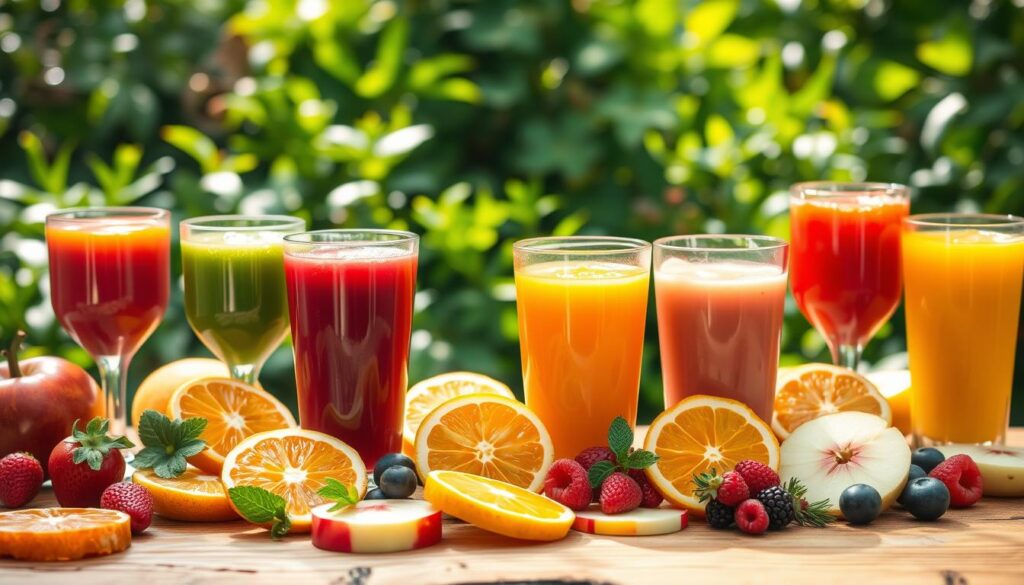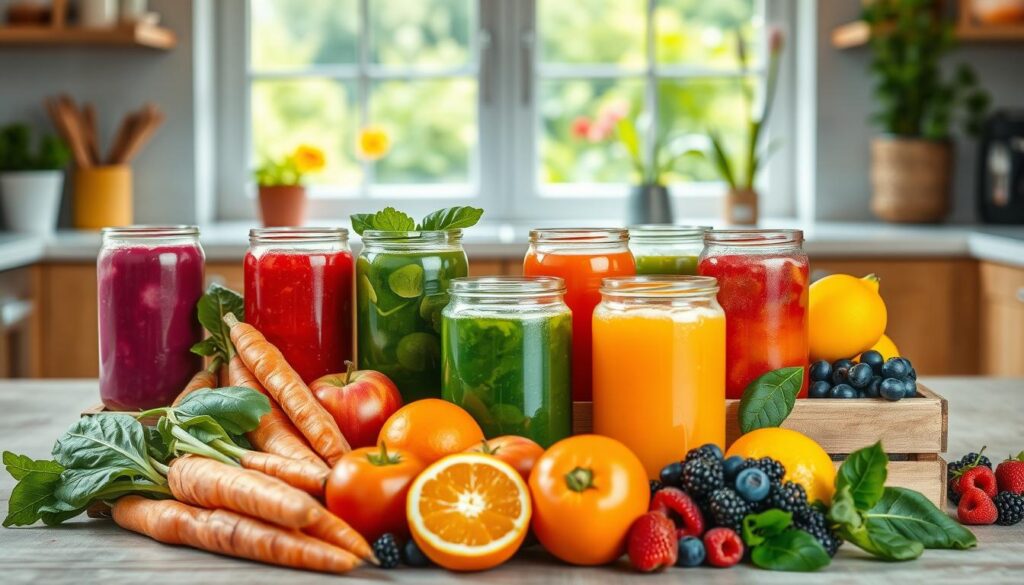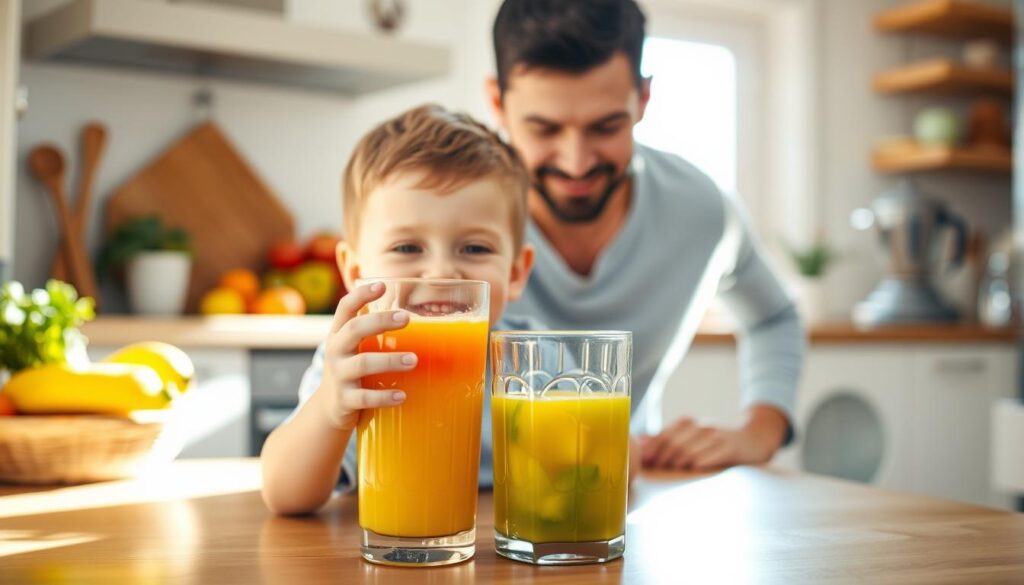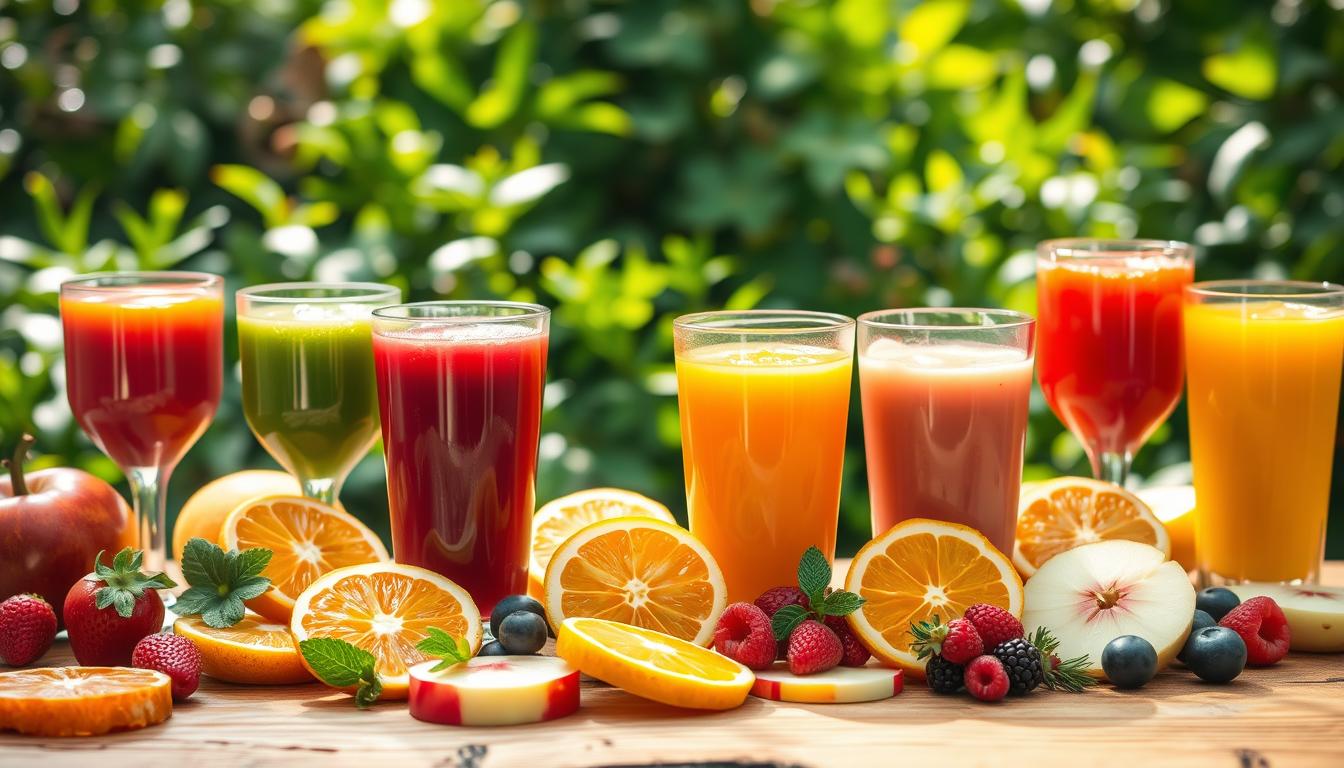
As a parent, I faced the daily challenge of getting my kids to eat enough fruits and veggies. That’s when I found the magic of healthy juice recipes. They’re a tasty way to boost their nutrition without the mealtime fights.
Juice recipes can change how your kids get the nutrients they need. Making fresh, homemade juices is a vibrant way to add vitamins and minerals to their diet. With the right approach, these healthy juice recipes can be a game-changer for your family’s health.
The American Academy of Pediatrics suggests introducing juice carefully, usually after 12 months. These juice recipes are not just about taste. They’re about giving your child the nutrients they need for growth and development.
Key Takeaways
- Healthy juice recipes can make nutrition fun for kids
- Fresh juices provide concentrated vitamins and minerals
- Homemade juices offer better control over sugar content
- Introduce juices carefully and in moderation
- Juice recipes can help overcome picky eating challenges
Table of Contents
Benefits of Fresh Juices for Children’s Health

Discovering the power of healthy juice recipes can change your child’s nutrition. Fresh juices are a tasty way to improve your child’s health. They give essential nutrients for growth and development.
Juicing recipes are not just yummy; they’re full of vitamins and minerals. These can greatly improve your child’s health. Let’s look at the amazing benefits of adding fresh juices to your child’s diet.
Immune System Support
Fresh juices are a natural way to boost your child’s immune system. They are packed with vitamin C, which fights off illnesses and supports health. Some key benefits include:
- Up to 100% daily vitamin C intake in a single serving
- Powerful antioxidants that fight harmful free radicals
- Natural protection against common childhood infections
Enhanced Nutrient Absorption
The liquid form of fresh juices makes nutrients easy for kids to digest. Juicing recipes break down fruits and vegetables into easily absorbable components. This ensures your child gets the most nutritional benefits.
- 70% of pediatricians recommend fresh juices for nutrient absorption
- Helps children who struggle with eating whole fruits and vegetables
- Supports digestive health through natural prebiotics
Natural Energy Boost
Unlike sugary drinks, healthy juice recipes give a clean, natural energy boost. These juices offer essential vitamins and minerals. They help keep energy levels up all day.
- Improves hydration levels
- Provides quick, natural nutrition
- Helps maintain steady energy without crash
By introducing carefully crafted juicing recipes, you’re giving your child a delicious way to better health and nutrition.
When to Introduce Juices to Your Child’s Diet

Knowing when to introduce juices to your child’s diet is important. The American Academy of Pediatrics offers guidelines for parents. These help make sure your child gets the right nutrition.
“Nutrition in early childhood sets the foundation for lifelong health habits.”
Pediatric experts say wait until your child is 12 months old before giving juice. Before that, babies should only have breast milk or infant formula. This helps them get the nutrients they need for growth.
- Babies under 12 months: No juice allowed
- Ages 1-3: Maximum 4 ounces per day
- Ages 4-6: Maximum 6 ounces per day
- Ages 7+: Up to one cup (8 ounces) daily
When introducing juices, choose 100% fruit juices without added sugars. Easy juice recipes can add nutrients and keep your child engaged. Mix juices with water to cut down sugar and prevent dental problems.
Whole fruits are better than juices. They give fiber and make your child feel full. If you do give juice, pick recipes that are healthy and follow the recommended amounts.
Pro tip: Always talk to your pediatrician before changing your child’s diet.
Essential Guidelines for Safe Juicing
Making safe and healthy juice for kids needs attention to detail. Knowing how to juice right helps you get the most health benefits. It also keeps your kids safe.
When making juice recipes, keep these tips in mind. They help you make tasty and nutritious drinks for your family.
Selecting Quality Ingredients
Great juice starts with top-notch produce. Here are some key tips:
- Choose organic fruits and veggies to avoid pesticides
- Wash all produce well before juicing
- Pick fresh, ripe ingredients for the best nutrition
- Follow the 80-20 rule: 80% veggies, 20% fruits for a balanced drink
Smart Storage Strategies
Right storage keeps your juice fresh and safe. Here’s what to do:
- Use airtight glass containers for storage
- Put juice in the fridge right after making it
- Drink it within 24-48 hours for the best taste
- Keep it cold all the time
Serving Size Recommendations
Knowing the right amount of juice is key for kids:
| Age Group | Daily Juice Intake |
|---|---|
| 4-6 years | 1/2 to 3/4 cup (4-6 ounces) |
| 7-10 years | 3/4 to 1 cup (6-8 ounces) |
“Moderation is key when introducing juice into your child’s diet.” – Pediatric Nutrition Expert
The aim of juice recipes is to add to, not replace, whole fruits and veggies. Well-made juices offer important nutrients. They also keep portion sizes right for kids.
Best Fruits and Vegetables for Kid-Friendly Juices
Making tasty and healthy juices for kids means picking the right fruits and veggies. The right choices can turn your juices into a superfood boost for your little ones.
Some fruits and veggies are top picks for kid-friendly juices. They’re packed with nutrients that make your juices both yummy and good for you:
- Apples: Sweet and full of fiber
- Carrots: Full of Vitamin A for healthy eyes
- Berries: Packed with antioxidants for a strong immune system
- Oranges: Rich in Vitamin C for fighting off sickness
- Spinach: A great source of iron for energy
When making juices, mix ingredients that go well together. For example, spinach and mangoes blend well. This way, you get the health benefits without the taste of veggies.
Tip for parents: Stick to three or four main ingredients. This makes making juice easy and keeps the flavors balanced. It’s a great way to make juices that are both fun and healthy.
Remember, the key to successful kid-friendly juices is making them taste great while providing essential nutrients!
Here are some fun juice recipes to try:
- ABC Juice (Apple, Beetroot, Carrot)
- Green Hulk Smoothie (Spinach, Banana, Kiwi)
- COP Juice (Carrot, Orange, Pear)
By choosing the right ingredients, you can make juices that help your child grow strong and healthy.
Healthy Juice Recipes That Kids Will Love
Making tasty and healthy juice for kids is easy. These simple recipes turn fresh ingredients into fun drinks. Your kids will love their daily dose of nutrients.
Sweet and Mild Combinations
Begin with flavors that kids will find interesting. Apple Beetroot Juice is a great choice. It’s sweet and packed with vitamins, hiding any strong veggie tastes.
- Apple Beetroot Juice: Combines sweet apples with earthy beetroot
- Honeydew Melon Cucumber Juice: Light, refreshing, and hydrating
- Strawberry Basil Juice: Adds a playful herb twist to fruity flavors
Colorful Rainbow Juices
Colorful juices grab kids’ attention. They’re not only fun to look at but also full of nutrients. Mix different fruits and veggies for a rainbow in a glass.
Hidden Veggie Blends
Adding veggies to juice can be fun. Kale Kiwi Juice is a great example. It mixes greens with sweet kiwi for a drink kids will enjoy.
Pro tip: Use a high-powered blender for smooth, well-integrated juice textures that children find more appealing.
These recipes make healthy drinks that kids will love. Try new combinations and let your kids help with juicing. It makes them more excited about healthy drinks.
Tips for Making Juices More Appealing to Children
Making healthy juices that kids will like is a fun challenge for parents. It’s all about making it fun and interactive. Let your kids pick the fruits and veggies they like.
Here are some creative ways to make juices more fun:
- Use colorful straws or fun-shaped ice cubes to make drinking juice more entertaining
- Create visually appealing juice presentations with rainbow-colored drinks
- Involve children in measuring and mixing ingredients
- Experiment with mild, sweet flavor combinations
Diluting juice can make it more appealing to kids and lower sugar. Mix one part juice with two to three parts water. This keeps them hydrated without overwhelming their taste buds.
| Age Group | Daily Fluid Requirement | Juice Dilution Recommendation |
|---|---|---|
| Toddlers (1-3 years) | 4 cups | 1:3 juice to water ratio |
| Children (4-8 years) | 5 cups | 1:2 juice to water ratio |
| Children (9-13 years) | 7-8 cups | 1:2 juice to water ratio |
It’s key to make making healthy juices a positive experience. Praise your kids for trying new things and keep it fun. With patience and creativity, your kids will learn to love healthy drinks.
Common Mistakes to Avoid When Juicing for Kids
Juicing is a great way to add more nutrients to your child’s diet. But, there are some big mistakes parents should steer clear of. Knowing these mistakes helps keep juicing safe and healthy for your family.
Creating healthy juicing recipes needs careful attention and understanding of common challenges.
Sugar Content Management
It’s key to watch how much sugar your child is getting from juices. Not all natural juices are created equal. Some fruits have a lot of sugar, which can be bad for your child’s health.
- Limit sweet fruits to one per serving
- Mix vegetables with fruits to reduce overall sugar content
- Use low-sugar vegetables like cucumber and celery as base ingredients
Food Safety Considerations
It’s vital to prepare food safely when making juices. Always wash your produce well and use clean tools to avoid contamination.
- Rinse all fruits and vegetables before juicing
- Use fresh, high-quality produce
- Clean juicing equipment immediately after use
“Fresh juice should be consumed within 15 minutes to retain maximum nutritional value.”
Proper Equipment Usage
The right juicer makes a big difference in your homemade juice’s quality. Choose a reliable machine that keeps nutrients safe and ensures safe juice making.
- Choose juicers with easy-to-clean components
- Select models with safe, child-friendly designs
- Avoid complicated machinery that might pose safety risks
By following these tips, you can make tasty and healthy juices for your child. This way, you avoid common mistakes and support your child’s health.
Health Considerations and Precautions
When looking into healthy juice recipes for kids, it’s important to know the health risks. Juices can be good for nutrition, but parents need to be careful. This ensures their child stays healthy.
Important health points for juice include:
- Managing sugar content carefully
- Ensuring proper nutrient balance
- Monitoring possible allergic reactions
- Consulting pediatric nutritionists
Pediatric experts say to keep a 3:1 vegetable-to-fruit ratio in juices. This helps avoid too much sugar. Kids with diabetes need to be extra careful with juice.
| Health Aspect | Recommendation |
|---|---|
| Daily Juice Intake | 4-6 ounces maximum |
| Sugar Content | Less than 10 grams per serving |
| Nutritional Focus | Prioritize vegetable-based juices |
Unpasteurized juices can be risky for kids, mainly those with weak immune systems. Always choose pasteurized or fresh juices. Use clean, quality ingredients.
Nutrition experts advise starting juices slowly and watching how your child reacts. Some kids might have stomach issues or allergies to certain juices.
Remember: Healthy juice recipes should complement, not replace, a balanced diet rich in whole foods.
Conclusion
Adding healthy juice recipes to your kids’ diet can change their eating habits for the better. Choose juices with 80% veggies and 20% fruits to keep sugar low. This way, you make tasty drinks that are good for their health.
To succeed, know how much to serve and pick the right ingredients. Start with 2-4 ounces and increase to 16 ounces as they get used to it. Use masticating juicers to get the most nutrients from veggies.
Juicing is more than making a drink. It’s a chance to try new tastes, teach about food, and build healthy habits. Your kids will start to like eating whole foods and enjoy fresh ingredients. With a little patience and creativity, making juice can become a fun family activity.
See these juice recipes as a way to improve your family’s health. Every sip brings you closer to better nutrition and happy moments together.


Hello! I hope you’re having a great day. Good luck 🙂